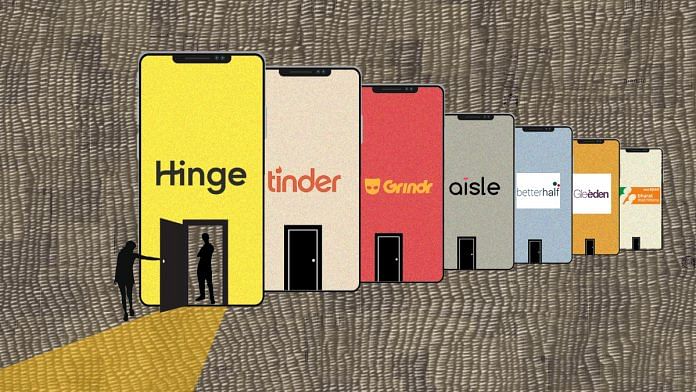Let’s be honest, conversations around consent have been amplified by dating apps. From Tinder to Bumble, discussing and pushing for conversations around consent seems to be a top priority for these apps. Released on 9 September, a short film by Tinder called Closure looks at mutual consent through the story of two people who are no longer together.
Covid-19 and extended lockdown made people yearn for human interaction, touch and company. Global seclusion was immensely difficult, especially for people who lived alone, and even otherwise. In August, Tinder released a global report, The Future of Dating Is Fluid, in which it said 2020 was its busiest year ever. The app was launched in 2012 in the United States and entered the Indian market in 2016. The report says, “60 per cent of members came to Tinder because they felt lonely and wanted to connect with people.”
On the other hand, a report by Bumble puts another perspective in place. About 70 per cent of Indian women felt that online bullying/harassment increased during the pandemic. Importantly, with dating becoming a fully online experience amid Covid-19, the chances of consent being violated and harassment being experienced also rose.
With conversations around consent and good practice gaining momentum, here are a few tips on online-dating etiquette for dummies:
Also Read: Dating is back. But Covid has made getting coffee with someone a lot more complicated
It’s all about consent
While the concept of ‘consent’ is by no means new, the word entered the popular Indian lingo after the 2016 film Pink, in which a brooding lawyer, played by Amitabh Bachchan, said “No means no” and breaks the silence over the nature of sensual/sexual interaction largely between men and women.
Strangely, that is sort of where the conversation began and ended — ’No means no’. Even before that, with the #MeToo movement, questions and conversations cropped up — is it always possible to spell an emphatic “no”? Is consent just a yes or no question? It’s taken years, but finally, in 2021, we are beginning to realise that consent is a multi-layered concept.
And it is made up of boundaries.
In this Tinder-sponsored video, four content creators/actors discuss the most asked questions about consent and the discussion is enlightening in terms of how everyone might have slipped up in trying to understand it, but one cannot stop at just that.
To call or not to call
Online etiquette includes whether you can actually switch platforms. Should you be on that call because the app gives you the option to? You need to ask, period. Assuming consent is really the wrong way to go about this. Sliding into ‘DMs’ unannounced is never ‘romantic’, it is only creepy, unless you have said you wish to connect on another platform, and have received an affirmative response.
Understanding that while Covid definitely put everyone in the spotlight and we had to learn and even unlearn online behaviour, it cannot be an excuse to push and cross boundaries. Not everyone feels comfortable with video calls. I, for one, would avoid it like the plague. And even if my workplace mandates Zoom interviews and meetings, I do not have to necessarily put myself through that in dating.
Also, since when did texting become a ‘tedious’ way of communicating? One should be allowed to feel a certain degree of comfort in communication over texts before moving on to calls, be it voice or video. And constantly insisting ‘I am better in-person’ or ‘I think a call would be better’ puts off people rather than convince them.
Also Read: This is how sugar daddies and sugar babies find each other in India these days
Mind your language
We have definitely taken certain steps in ensuring that online presence and vocabulary is enhanced with words like ‘toxic’ and ‘accountability’, but they are still little understood. They are still viewed as absolutes, rather than work-in-progress and probably used to define others, more than to self-assess.
And of course, there is the question of sexting. Even for something that might seem fairly innocuous to you, sending an explicit message or a ‘non-veg’ joke, as it were, or insisting on sexting because you may have had a frank discussion about sex, is unwelcome, and frankly, just plain ol’ harassment.
Also Read: Less ghosting, breadcrumbing, catfishing: Bumble survey says Covid has made online dating better
To meet or not to meet
In the kind of ‘carpe diem’ or ‘YOLO’ world, as Gen Z would call it, that we inhabit, we tend to prioritise in-person meetings over one behind screens. But knowing somebody’s comfort level is important. Some people prefer to meet almost right away, while others might need some time to.
Something that came up in a lot of discussions with female friends is that if the date ends with a kiss, there seems to be an assumption, almost immediately, that it will be followed by sex. While sex might be a step, a kiss certainly does not seal it. And most importantly, your date might not really want it.
It’s important to constantly progress towards a more inclusive approach to consent, and keep asking questions, and yes, permissions. In fact, here, I am reminded of the famous dialogue from Gangs of Wasseypur – Part 2 — “Permission leni chaiye na?”, be it before holding hands or initiating sex, or even sliding into Instagram or Facebook DMs.
Views are personal.



